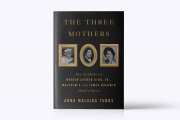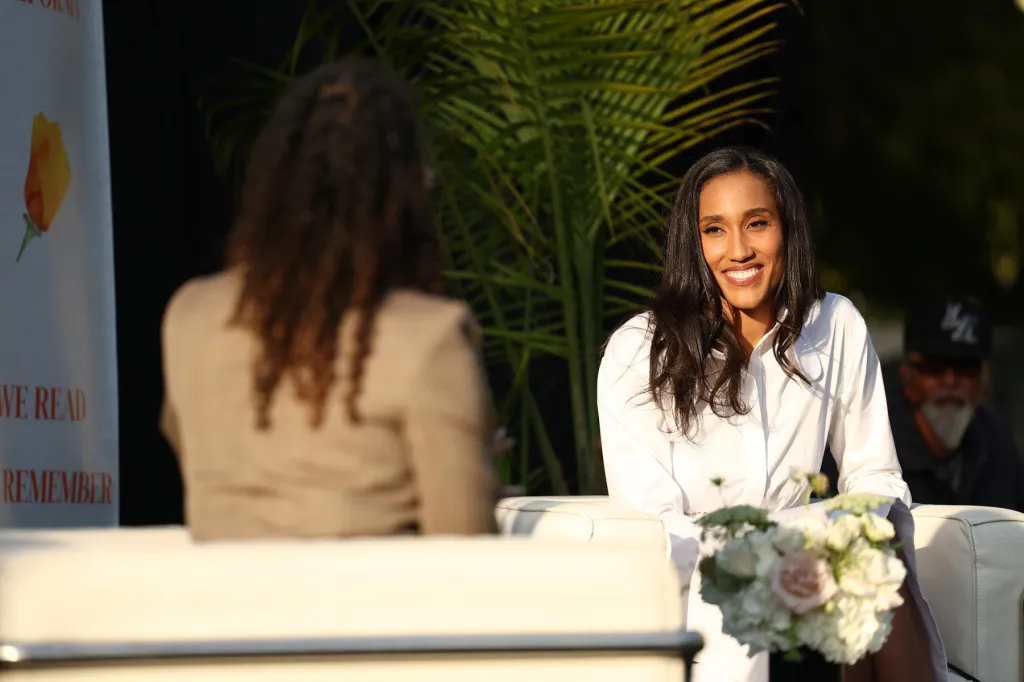
Trump’s STEM Funding Attacks Will Undo Decades of Gender Equity Progress
May 22, 2025
Prescient Warnings About Helene Didn’t Reach People in Harm’s Way. Here Are 5 Lessons for the Next Hurricane.
May 22, 2025When Roe v. Wade was overturned in the summer of 2022, Anna Malaika Tubbs was in the middle of writing her second book about how fabricated hierarchies of race and gender have become deeply ingrained – and unnoticed – in the United States. When federal protections for abortion access were lost, Tubbs said people were so shocked, asking “How did this happen?” and “Why did this happen?”
“It just really felt like I had to get this book out there,” Tubbs said. “It’s a book on understanding the system of American patriarchy, how that came from the minds of the founding fathers, how they systemized their vision and how we still see traces of it.”
Tubbs, who holds a doctorate in sociology and master’s degree in multidisciplinary gender studies from the University of Cambridge, again felt urgency to publish this book one year later when the Barbie movie came out in the summer of 2023. The film grossed over $1.4 billion worldwide, making it one of the highest-grossing of all time and spurring widespread conversation about gender roles and societal norms.
“So many people saw this as sort of revolutionary, and there were so many people in the audience around me crying about this film,” Tubbs said. “The only thing the film said was that women need to wake up to the fact that patriarchy exists, spread the word to each other and now everything’s going to be just fine. And that is not the full picture. We’re blaming the victim, especially mothers, and telling them they just need to become more empowered — and that’s absolutely not the case.”
The following year, as the presidential election was coming to a close, people around Tubbs, including her husband, were excited and hopeful for then-Vice President Kamala Harris, the Democratic nominee. But Tubbs, still working on her book, was fairly positive that President Donald Trump was going to win. She saw connections between her research and the whispers about Project 2025, Trump’s rhetoric around what it means to make America great again and how his campaign spoke about people of color and immigrants.
-
Read Next:

-
Read Next:
‘The Three Mothers’ honors the women who raised Martin Luther King Jr., Malcolm X and James Baldwin
“I was so angry in the sense that I kept hoping and wishing that this book could be out right now,” she said. “This could help so many people understand what’s going on and why this is happening. I think we can understand who to turn to for solutions, how we need to vote differently and what kind of policies we need in place so that this doesn’t repeat itself.”
Tubbs’ new book, “Erased: What American Patriarchy Has Hidden From Us,” hit the stands on May 20. In an interview with The 19th, Tubbs discussed how an unjust system has been perpetuated and outlined concrete steps for how to create a new more equitable country.
This interview has been edited for length and clarity.
Mariel Padilla: You mention in the book that American patriarchy is distinct from other countries and cultures. Can you elaborate on how?
Anna Malaika Tubbs: When I say American patriarchy, I’m not trying to say that it’s the only patriarchal system by any means at all. I have seen patriarchy across the world — the premise being that men should hold more power over women. What I am saying is that one of the reasons we haven’t been able to really challenge patriarchy in the United States is that we haven’t contextualized it.
American patriarchy is going to be different than Mexican patriarchy, for instance, because of our history with slavery. Who is defined as a man and woman and how we define that binary is largely connected with our history: The founding fathers wrote into the Constitution that to be a man was to have control over other people, to own land and to have the ability to vote. Women were completely left out of that. Black men certainly didn’t have access to this and even some poor White men weren’t included.
I think one of the primary ways in which patriarchy has persisted is by tricking us into thinking that race and gender aren’t intertwined with each other. When we go back to that breakdown of what it meant to hold power in the United States, we were talking about White, cisgendered, able-bodied, privileged men. It was a very specific, very limited group on purpose because they wanted to maintain their own power. And so we can’t think about humanity in the U.S. without understanding race, and we can’t think about that without understanding gender.
Let’s appreciate the gains we’ve made. But also ask ourselves why we’re still so vulnerable. We’re still coming up against a system that is at the core of our nation, and we’re not challenging it. We’re only kind of putting band-aids on some of its symptoms and not really addressing the disease where all of those are stemming from.

(Araya Doheny/Getty Images)
The title of the book is “Erased.” For me, it called attention to the fact that there are actors actively doing the erasing, something is being erased and therefore what’s left is not the full picture. Can you walk through how you came to this title?
I feel like American patriarchy is doing the erasure, but it also has purposely erased itself from the picture so that we think that everything happening to us is natural and unavoidable. We think things have to happen a certain way, and we continue to sort of be surprised because we can’t actually trace it.
In another way, it’s like a pencil mark that you try to erase, but it is still there. You can’t ever fully erase it, and that’s where the recovery part comes in. Because while you try to take something away, we can always access it by retracing the lines and piecing things together. This is especially important at a time when books are being banned and really blatant erasure is happening — we have to reclaim.
The last several parts of your book discuss solutions. How can people — particularly women and people of color — take action, resist unjust systems and create a more equitable society?
It’s a step-by-step process. I always say we have to start individually. Once you’ve gone through the book and you understand what has been so ingrained, how even maybe our parents have parented us and our teachers have taught us — ask yourself how you see yourself. Do you see yourself as someone who’s supposed to dominate other people? Do you see yourself on this trajectory of needing more power to finally be treated the way you want to be treated? Do you feel the need to wield control over people around you? Or do you see yourself as somebody who’s supposed to be silenced? The individual piece of this is just a general reflection on how the system has already influenced you.
The second part is our relationships. How are we interacting with each other as a result of this system? How are we parenting our children? Are we trying to dominate them? Are we trying to make them fit into this social order because we’re afraid of what might happen to them otherwise? How are we allowing American patriarchy and its ideals to infiltrate our closest relationships, our marriages, our ties to our parents?
The third part is a community-level reflection. What are the ways in which we can start fighting against the system by meeting each other’s needs? You don’t have to wait for a national shift. We can start making shifts in our own families and our immediate communities. We can think about how someone else’s pain is hurting me and start to find solutions together. This will change how we vote and who we vote for and the policies we support that bring us back to the things that American patriarchy has taken from us.
The 19th has a relationship with Bookshop.org. If you make a purchase through the Bookshop links on our site, we may earn an affiliate commission.
Great Job Mariel Padilla & the Team @ The 19th Source link for sharing this story.






